Efficacy and cost-effectiveness of a community-based model of care for older patients with complex needs: a study protocol for a multicentre randomised controlled trial using a stepped wedge cluster design
- PMID: 30514378
- PMCID: PMC6280415
- DOI: 10.1186/s13063-018-3038-0
Efficacy and cost-effectiveness of a community-based model of care for older patients with complex needs: a study protocol for a multicentre randomised controlled trial using a stepped wedge cluster design
Abstract
Background: Community-dwelling older persons with complex care needs may deteriorate rapidly and require hospitalisation if they receive inadequate support for their conditions in the community.
Intervention: A comprehensive, multidimensional geriatric assessment with care coordination was performed in a community setting-Older Persons ENablement And Rehabilitation for Complex Health conditions (OPEN ARCH).
Objectives: This study will assess the acceptability and determine the impact of the OPEN ARCH intervention on the health and quality of life outcomes, health and social services utilisation of older people with multiple chronic conditions and emerging complex care needs. An economic evaluation will determine whether OPEN ARCH is cost-effective when compared to the standard care.
Methods/design: This multicentre randomised controlled trial uses a stepped wedge cluster design with repeated cross-sectional samples. General practitioners (GPs; n ≥ 10) will be randomised as 'clusters' at baseline using simple randomisation. Each GP cluster will recruit 10-12 participants. Data will be collected on each participant at 3-month intervals (- 3, 0, 3, 6 and 9 months). The primary outcome is health and social service utilisation as measured by Emergency Department presentations, hospital admissions, in-patient bed days, allied health and community support services. Secondary outcomes include functional status, quality of life and participants' satisfaction. Cost-effectiveness of the intervention will be assessed as the change to cost outcomes, including the cost of implementing the intervention and subsequent use of services, and the change to health benefits represented by quality adjusted life years.
Discussion: The results will have direct implications for the design and wider implementation of this new model of care for community-dwelling older persons with complex care needs. Additionally, it will contribute to the evidence base on acceptability, efficacy and cost-effectiveness of the intervention for this high-risk group of older people.
Trial registration: Australian New Zealand Clinical Trials Registry, ACTRN12617000198325p . Registered on 6 February 2017.
Keywords: Complex care needs; Comprehensive geriatric assessment; Cost utility analysis; Effectiveness; Elderly; Integrated care; Model of care; OPEN ARCH; Quality of life.
Conflict of interest statement
Authors’ information
IK is a Senior Postdoctoral Fellow in Health Economics at the Centre for Indigenous Health Equity Research, School of Health, Medical and Applied Sciences at CQUniversity and an Adjunct Senior Research Fellow at the Cairns Institute, James Cook University.
SJ is an Epidemiologist, currently employed in project management with Torres and Cape Hospital and Health Service, and is also an Adjunct Research Fellow at the Cairns Institute, James Cook University and CQUniversity.
JM is OPEN ARCH project manager at Cairns and Hinterland Hospital and Health Service.
RQ is an Older Persons Liaison Service clinician at Cairns and Hinterland Hospital and Health Service, and a research officer within the Health Ageing Research Team (HART) at James Cook University.
DH is a Health Practitioner Principal Research Fellow at Cairns and Hinterland Hospital and Health Service.
CMD is a Professor in Health Economics at the Centre for Indigenous Health Equity Research and School of Health, Medical and Applied Sciences at CQUniversity.
ES is a Clinical Director, Older Persons, Sub-acute and Rehabilitation (OPSAR) Cairns and Hinterland Hospital and Health Service, and an Adjunct Associate Professor at James Cook University.
Ethics approval and consent to participate
This study has received approval from the Far North Queensland Human Research Ethics Committees (HREC/17/QCH/104-1174). The study will be carried out in compliance with national and state legal and regulatory requirements; and according to the Australian Medical Association Code of Ethics and the International Principles of Good Clinical Practice (ICH-GCP).
Any modifications to the protocol, which may impact on the conduct of the study, including changes of study objectives, study design, population, sample sizes, study procedures or significant administrative aspects, will be made in agreement with the ethics committees prior to implementation [11]. Administrative changes of the protocol, as minor corrections and/or clarifications that have no effect on the study, will be agreed upon by the research steering committee and documented in a memorandum [11]. The research steering committee will meet every second month to review the progress and any potential safety considerations that arise during the course of the OPEN ARCH trial with research governance provided by both the CHHHS and the TCHHS Governance Committees.
Consent for publication
Not applicable. Published data will be aggregated and de-identified.
Competing interests
The authors declare that they have no competing interests.
Publisher’s Note
Springer Nature remains neutral with regard to jurisdictional claims in published maps and institutional affiliations.
Figures
References
-
- Australian Institute of Health and Welfare . Cat no AUS 178. Canberra: AIHW; 2014. Australia’s health 2014.
-
- Beswick AD, Rees K, Dieppe P, Ayis S, Gooberman-Hill R, Horwood J, Ebrahim S. Complex interventions to improve physical function and maintain independent living in elderly people: a systematic review and meta-analysis. Lancet. 2008;371(9614):725–735. doi: 10.1016/S0140-6736(08)60342-6. - DOI - PMC - PubMed
-
- National Health and Hospital Reform Commission . A healthier future for all Australians, Final Report of the National Health and Hospital Reform Commission. Canberra: NHHRC; 2009. - PubMed
-
- Strivens E, Harvey D, Foster M, Quigley R, Wilson M. Analysing sub-acute and primary health care interfaces – research in the elderly. ASPIRE Study. Canberra: Australian Primary Health Care Research Institute; 2015.
Publication types
MeSH terms
Grants and funding
LinkOut - more resources
Full Text Sources



